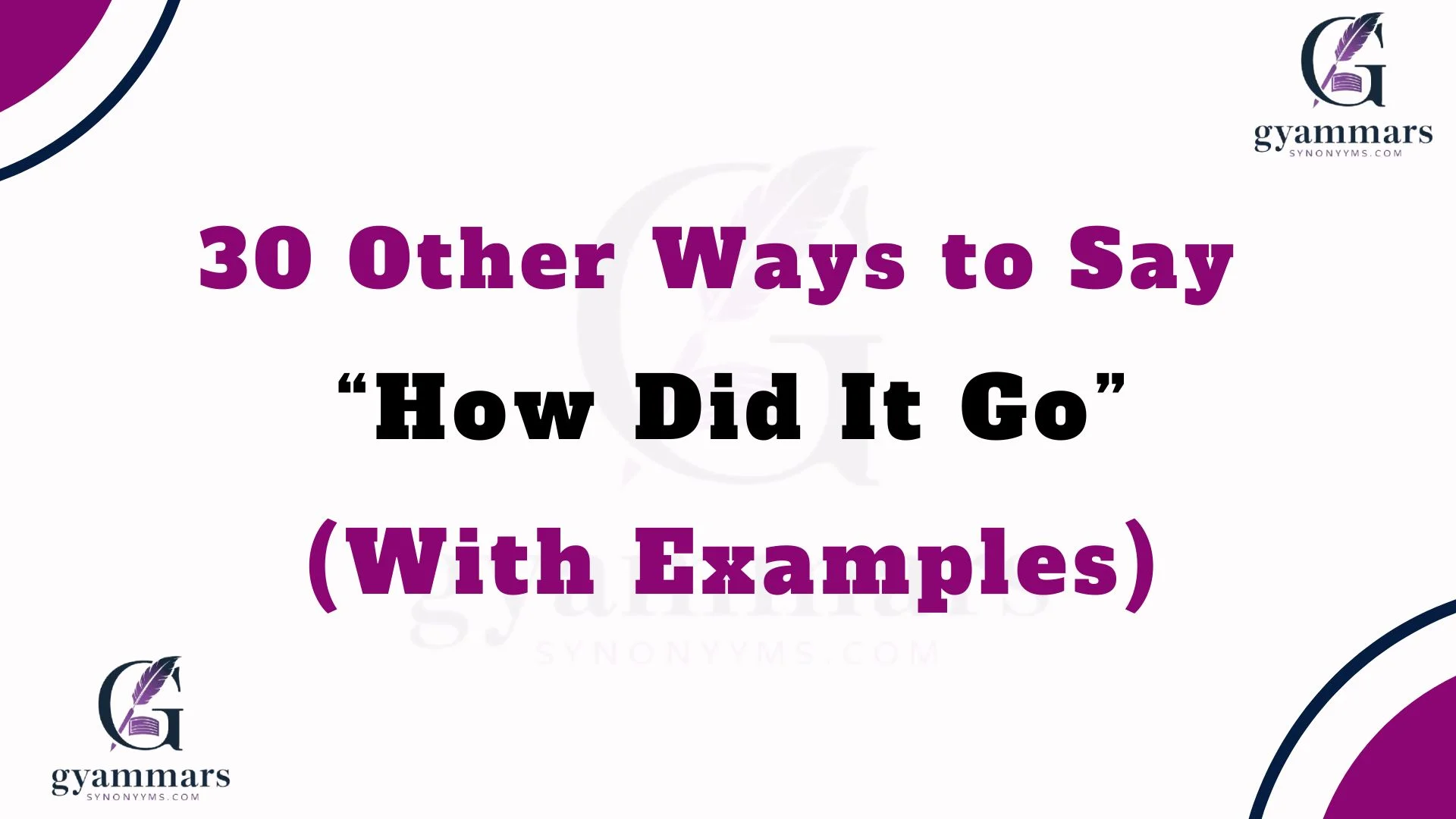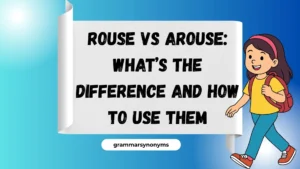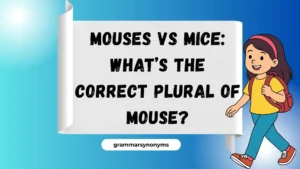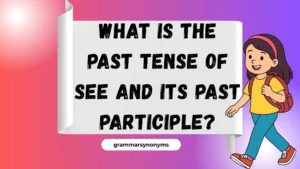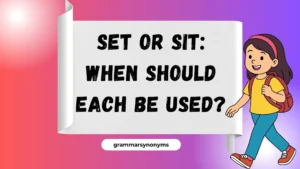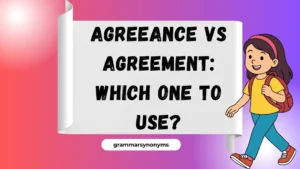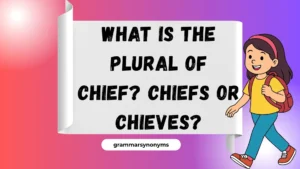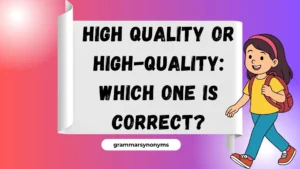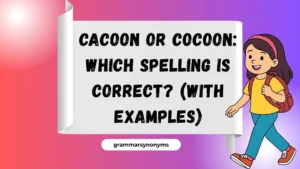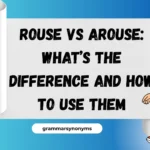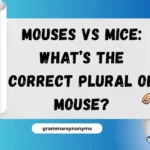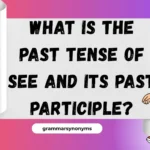Finding the right words to check in with someone can make a huge difference. Instead of repeating the same phrase, like “How did it go?”, you can use more warm, thoughtful, and creative expressions. These alternatives show genuine care, help deepen conversations, and make your messages feel personal and meaningful.
In this article, we’ll explore 30 empathetic alternatives, along with their definitions, best uses, and tones.
What Does “How Did It Go” Mean?
The phrase “How did it go?” is a casual way to ask about the outcome of an event, activity, or situation. It’s often used to express curiosity or concern about someone’s experience, whether it’s a job interview, meeting, performance, or even a casual day.
Is It Professional/Polite to Say “How Did It Go”?
Yes, “How did it go?” is generally polite and acceptable in both professional and personal settings. However, in formal contexts, people may prefer alternatives like “How was the outcome?” or “How did everything turn out?”. The key is tone and context—with friends, it’s casual; at work, you may want to use a more refined option.
Pros and Cons of Saying “How Did It Go?”
Pros:
- Simple and universally understood.
- Shows care and interest.
- Works in both personal and professional settings.
Cons:
- Can sound repetitive if overused.
- May feel too generic or rushed.
- Doesn’t always reflect deeper emotional concern.
Synonyms For “How Did It Go”
- How was everything?
- How did things turn out?
- How was your experience?
- How did that work out?
- How did you feel about it?
- How was the outcome?
- Did it go well?
- How did you manage?
- What was it like?
- How did everything work out?
- How was that for you?
- What happened in the end?
- How did you find it?
- How did you get on?
- How did it turn out for you?
- How was the result?
- How did it feel?
- How did things go for you?
- What was the outcome?
- How did everything go?
- What did you think?
- How did you handle it?
- How was that experience for you?
- How did you go with that?
- What did you make of it?
- How did it all go?
- How did things shape up?
- How was that for you overall?
- How did you get through it?
- How did it work out in the end?
1. How Was Everything?
Definition: A broad way of asking about someone’s overall experience.
Detailed Explanation: Instead of focusing only on results, this phrase invites the person to share feelings and details.
Scenario Example: “You had that client meeting today—how was everything?”
Best Use: Great for both personal and professional check-ins.
Tone: Warm, caring, slightly formal.
Additional Notes: Sounds supportive without being intrusive.
2. How Did Things Turn Out?
Definition: Focuses on the final result of a situation.
Detailed Explanation: Works when you want to know the outcome rather than the process.
Scenario Example: “I know you were nervous about your test—how did things turn out?”
Best Use: Professional and personal.
Tone: Neutral but engaged.
Additional Notes: Perfect when asking about results like exams, meetings, or interviews.
3. How Was Your Experience?
Definition: Emphasizes feelings and impressions, not just results.
Detailed Explanation: Encourages storytelling and reflection.
Scenario Example: “You finally tried that new restaurant—how was your experience?”
Best Use: Social and personal conversations.
Tone: Friendly, inviting.
Additional Notes: Great when you want them to open up.
4. How Did That Work Out?
Definition: A casual way to ask about the end result.
Detailed Explanation: Focuses on outcome but feels less formal.
Scenario Example: “You were adjusting your schedule—how did that work out?”
Best Use: Casual, everyday talk.
Tone: Light, conversational.
Additional Notes: Best for close relationships.
5. How Did You Feel About It?
Definition: Shifts the focus to emotions and reactions.
Detailed Explanation: Shows deeper concern for the person’s emotional state.
Scenario Example: “After giving that big presentation—how did you feel about it?”
Best Use: Supportive and empathetic conversations.
Tone: Gentle, caring.
Additional Notes: Best when offering emotional support.
6. How Was the Outcome?
Definition: A more professional phrasing of “How did it go?”
Detailed Explanation: Formal and focused on results.
Scenario Example: “The quarterly meeting was important—how was the outcome?”
Best Use: Workplace, academic, and professional settings.
Tone: Formal, respectful.
Additional Notes: Avoid in casual chats—it can sound stiff.
7. Did It Go Well?
Definition: A positive-leaning way to check in.
Detailed Explanation: Suggests optimism while asking about results.
Scenario Example: “You had your exam today—did it go well?”
Best Use: Both personal and professional.
Tone: Supportive, hopeful.
Additional Notes: Encourages reassurance.
8. How Did You Manage?
Definition: Emphasizes effort and handling of a situation.
Detailed Explanation: Shows respect for the challenges they faced.
Scenario Example: “That must’ve been tough—how did you manage?”
Best Use: Supportive conversations, stressful events.
Tone: Empathetic, caring.
Additional Notes: Use when you know they faced obstacles.
9. What Was It Like?
Definition: Invites a storytelling response.
Detailed Explanation: Focuses on the experience, not just results.
Scenario Example: “You went skydiving—what was it like?”
Best Use: Personal, engaging conversations.
Tone: Curious, friendly.
Additional Notes: Opens the door for longer stories.
10. How Did Everything Work Out?
Definition: A reassuring way to ask about results.
Detailed Explanation: Combines both outcome and overall process.
Scenario Example: “You had the repair service today—how did everything work out?”
Best Use: Both casual and semi-formal settings.
Tone: Warm, balanced.
Additional Notes: A thoughtful middle ground.
11. How Was That For You?
Definition: Focuses on personal reaction.
Detailed Explanation: Shows emotional consideration.
Scenario Example: “That retreat sounded intense—how was that for you?”
Best Use: Personal conversations.
Tone: Gentle, empathetic.
Additional Notes: Makes people feel seen.
12. What Happened in the End?
Definition: A direct way to ask about the final result.
Detailed Explanation: Good when you’ve followed their journey.
Scenario Example: “So, about that deal—what happened in the end?”
Best Use: Close relationships, informal settings.
Tone: Curious, friendly.
Additional Notes: Not ideal for very formal contexts.
13. How Did You Find It?
Definition: A polite way to ask for someone’s opinion or experience.
Detailed Explanation: Often used in British English.
Scenario Example: “You visited Paris—how did you find it?”
Best Use: Formal and casual alike.
Tone: Neutral, refined.
Additional Notes: Avoid literal misunderstanding—means “What was your impression?” not “How did you locate it?”.
14. How Did You Get On?
Definition: A British phrase meaning “How did it go?”
Detailed Explanation: Common in UK English, sounds warm and supportive.
Scenario Example: “You had your training—how did you get on?”
Best Use: Friendly, casual.
Tone: Warm, conversational.
Additional Notes: Regional phrase, may sound unusual outside UK.
15. How Did It Turn Out for You?
Definition: A personalized way to ask about the result.
Detailed Explanation: Keeps the focus on them.
Scenario Example: “You switched projects—how did it turn out for you?”
Best Use: Supportive, casual-professional.
Tone: Caring, considerate.
Additional Notes: Sounds thoughtful and individual-focused.
16. How Was the Result?
Definition: A formal way to ask about the outcome.
Detailed Explanation: Straightforward and concise.
Scenario Example: “The audit was yesterday—how was the result?”
Best Use: Professional, academic, medical contexts.
Tone: Formal, neutral.
Additional Notes: Avoid in casual chats.
17. How Did It Feel?
Definition: Focuses on emotions, not facts.
Detailed Explanation: Encourages them to share feelings.
Scenario Example: “That first performance must’ve been big—how did it feel?”
Best Use: Emotional support, friendships.
Tone: Warm, empathetic.
Additional Notes: Perfect for bonding.
18. How Did Things Go for You?
Definition: Personalized version of the original.
Detailed Explanation: Adds warmth by including “for you.”
Scenario Example: “You had that workshop—how did things go for you?”
Best Use: Friendly, supportive.
Tone: Warm, personal.
Additional Notes: Makes it sound genuine.
19. What Was the Outcome?
Definition: A direct and professional phrase.
Detailed Explanation: Focuses only on results.
Scenario Example: “The board met today—what was the outcome?”
Best Use: Business, workplace, formal.
Tone: Professional, neutral.
Additional Notes: Use in meetings, avoid casual chats.
20. How Did Everything Go?
Definition: Slightly warmer than the original phrase.
Detailed Explanation: Adds emphasis on overall process.
Scenario Example: “You traveled back safely—how did everything go?”
Best Use: Flexible—personal and professional.
Tone: Friendly, caring.
Additional Notes: Great all-around choice.
21. What Did You Think?
Definition: Focuses on opinion and reflection.
Detailed Explanation: Invites subjective feedback.
Scenario Example: “You tried that workshop—what did you think?”
Best Use: Personal, creative, casual-professional.
Tone: Curious, engaging.
Additional Notes: Encourages deeper sharing.
22. How Did You Handle It?
Definition: Recognizes effort and management.
Detailed Explanation: Useful when challenges are expected.
Scenario Example: “That project was tough—how did you handle it?”
Best Use: Supportive conversations.
Tone: Empathetic, respectful.
Additional Notes: Good for acknowledging struggles.
23. How Was That Experience for You?
Definition: Personal, caring version of “How was your experience?”.
Detailed Explanation: Encourages storytelling with focus on them.
Scenario Example: “Your first marathon—how was that experience for you?”
Best Use: Friendships, supportive talks.
Tone: Empathetic, thoughtful.
Additional Notes: Makes the person feel valued.
24. How Did You Go With That?
Definition: A regional (Australian/British) way of asking.
Detailed Explanation: Less common globally but natural in some English dialects.
Scenario Example: “You were sorting the paperwork—how did you go with that?”
Best Use: Informal, regional.
Tone: Casual, conversational.
Additional Notes: May sound unusual outside certain regions.
Also Read This : 30 Other Ways to Say “No Worries” Professionally (With Examples)
25. What Did You Make of It?
Definition: Invites interpretation and opinion.
Detailed Explanation: Common in UK English, thoughtful in tone.
Scenario Example: “You read that book—what did you make of it?”
Best Use: Conversations about events, books, films, etc.
Tone: Reflective, curious.
Additional Notes: A creative alternative.
26. How Did It All Go?
Definition: A softer, friendlier variation.
Detailed Explanation: Makes the phrase feel casual but warm.
Scenario Example: “You hosted the dinner—how did it all go?”
Best Use: Casual chats, friendly check-ins.
Tone: Light, caring.
Additional Notes: Smooth and natural in speech.
27. How Did Things Shape Up?
Definition: Focuses on progress and results.
Detailed Explanation: Suggests interest in development.
Scenario Example: “That campaign seemed tricky—how did things shape up?”
Best Use: Casual-professional.
Tone: Curious, optimistic.
Additional Notes: Sounds slightly modern and creative.
28. How Was That for You Overall?
Definition: A balanced way to ask about experience + outcome.
Detailed Explanation: Comprehensive, encouraging a complete response.
Scenario Example: “Your first semester abroad—how was that for you overall?”
Best Use: Personal, supportive.
Tone: Empathetic, thoughtful.
Additional Notes: Encourages both facts and feelings.
29. How Did You Get Through It?
Definition: Highlights effort in tough situations.
Detailed Explanation: Suggests empathy for challenges.
Scenario Example: “That must’ve been exhausting—how did you get through it?”
Best Use: Difficult experiences, emotional support.
Tone: Caring, compassionate.
Additional Notes: Avoid in light or casual settings.
30. How Did It Work Out in the End?
Definition: A final-outcome-focused variation.
Detailed Explanation: Puts emphasis on closure.
Scenario Example: “You were waiting for approval—how did it work out in the end?”
Best Use: Personal and professional alike.
Tone: Curious, supportive.
Additional Notes: Strong way to ask about results with closure.
Conclusion
Using alternatives to “How did it go?” helps you express genuine care, empathy, and curiosity in conversations. Whether you’re supporting a friend, checking in on a colleague, or asking about someone’s personal journey, these phrases allow for warmer, deeper, and more thoughtful connections.

“Mia Rose at Grammar Synonyms is your ultimate guide to mastering language with style and precision. Whether you’re looking to enhance your vocabulary, perfect your grammar, or discover the ideal synonym, Mia Rose offers expert resources and creative solutions to help you express yourself flawlessly. With Grammar Synonyms, unlock a world of language possibilities and elevate every piece of writing you create.
